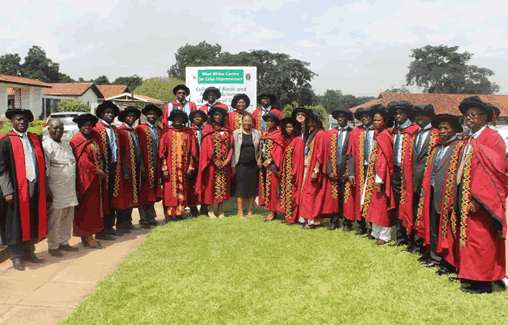AGRA hails WACCI’s success story
 The Alliance for a Green Revolution in Africa (AGRA), has hailed the West Africa Centre for Crop Improvement (WACCI) of the University of Ghana, for its success in training plant breeders for Africa.
The Alliance for a Green Revolution in Africa (AGRA), has hailed the West Africa Centre for Crop Improvement (WACCI) of the University of Ghana, for its success in training plant breeders for Africa.
The training is part of efforts to help address the food and nutrition insecurity problem on the continent.
Dr Rufaro Madakadze, AGRA Programme Officer in-charge of Capacity Building, said AGRA was proud of what WACCI had been able to achieve since its inception over the past decade in transforming the agricultural sector in Africa.
Speaking to the Ghana News Agency on the sideline of the University of Ghana’s College of Basic and Applied Sciences Congregation, Dr Madakadze said: “WACCI is 10 years old now and this the highest numbers of people we have graduated from there. Today, they graduated 17 people from seven countries in West Africa.”
“This is unprecedented on the continent, we haven’t heard such a concerted effort in training plant breeders as we’ve seen WACCI do,” she added.
The WACCI is now the leading centre in plant breeding education producing a record number of PhD graduates in a single programme in Africa.
At this year’s congregation of the University of Ghana, WACCI presented 17 PhD candidates in plant breeding programme, which is the highest record of PhD candidates to be graduated in a single programme in Ghana in particular and Africa general.
The 17 PhD students from seven African countries were made up of nine from Francophone, and eight from Anglophone; of which nine were males and the rest females.
Indeed, it would be recalled that at the 2015/2016 academic year’s Congregation, the Centre also presented 7 PhD candidates.
WACCI, one of the World Bank Africa Centres of Excellence, is a partnership between the University of Ghana and Cornell University, United States that was established in June 2007 with funding from the Alliance for a Green Revolution in Africa (AGRA) at the University of Ghana to train Plant Breeders in Africa working on the improvement of African crops in local environments for farmers in Africa.
AGRA provided the initial funds for the establishment of the Centre and provided full scholarships for 53 PhD students, in addition to administrative support.
Its vision is to become the foremost Centre for post-graduate training and research in crop improvement in Africa.
Dr Madakadze said, WACCI graduates were now working on a wide range of crops: maize, pearl millet, cassava, and all the priority crops for the West African sub-region.
“Some of the students graduated are doing great exploits out of here. We have the first maize varieties released in Mali, which are drought tolerant and short seasoned and is something that has transformed the country and sub-region,” she said.
She also mentioned sweet potatoes varieties in Burkina Faso, with rice varieties coming up in Ghana: “so this is something great,” she added.
On the way forward after the end of the AGRA support programme for WACCI by the end of this year, Dr Madakadze said: “we will still be working with WACCI, but it may be in a reduced capacity..
“In the last 10 years we fully funded the training of 53 of the 108 students that WACCI has.
“Thus AGRA’s role is to catalyse. So we’ve catalysed, we’ve funded the first 53, we’ve funded the establishment of a world class programme.
“Now WACCI is mainly at the donor’s muscle, but where ever we can chip in, we will be working closely with them to see what we can do.”
She noted that their focus in the next few years was not funding postgraduate levels so much but rather funding the lower level of capacity close to the farmers so that varieties that were released get to the farmers.
Professor Eric Y. Danquah, the founding Director of WACCI, speaking in an interview with the Ghana News Agency on the sideline of the University of Ghana’s Congregation, congratulate the students for their sterling performance.
He said all the graduates were returning to their home institutions to take their PhD research to the next level and work towards releasing improved and climate-smart varieties of staple crops for increased productivity in farmers’ fields in seven countries in West and Central Africa.
Two of the fresh graduates Dr Adesike Oladoyin Kolawole of Ladoke Akinlota University of Technology, Ogbomoso, Oyo State, Nigeria and Dr. Solomon Olufemi Afuape of the National Root Crop Research Institute, Nigeria, expressed their gratitude to AGRA for funding their PhD programme.
Dr Kolawole, who researched on improving maize grains yield said: “I have been equipped with knowledge and skills at WACCI.
“My teaching and data analysis skills have improved. We were exposed to modern approaches in plant breeding as well advances in pedagogy. So as a lecturer, I have learnt a lot of things, I can go back and impact teaching and learning in my university. I can adequately supervise students since I am equipped to do that now. Thanks be to WACCI”.
Dr Afuape, who also researched on sweet potatoes said, the knowledge that he had gained would be used to develop new varieties to help address the food and nutrition insecurity situation in Africa.
Source: GNA
